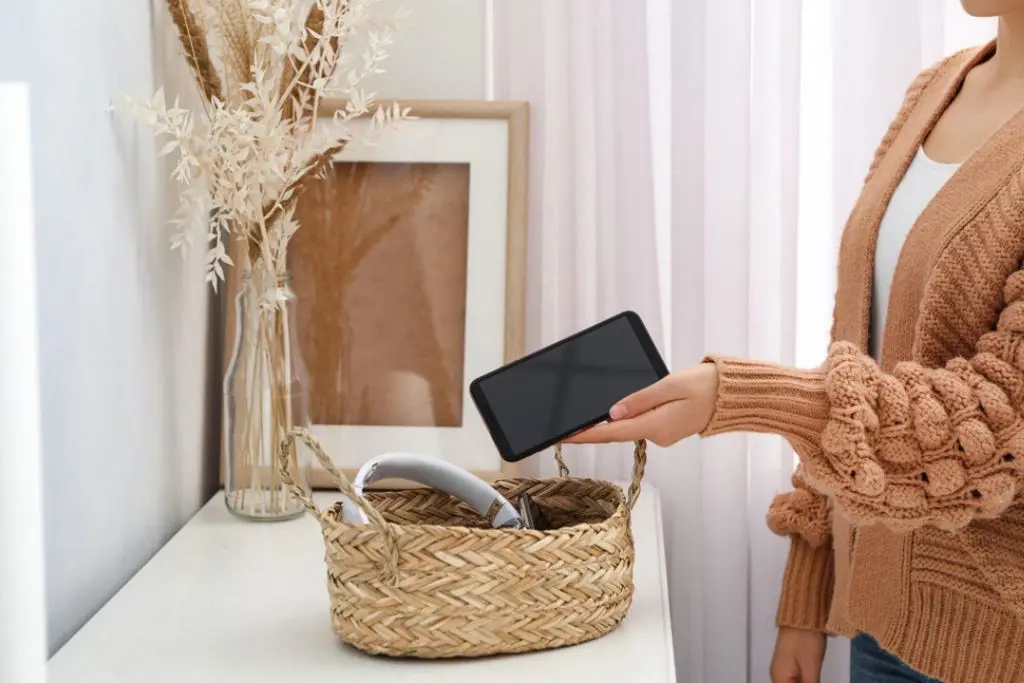How To Do A Digital Detox

February 16, 2023 - Updated February 16, 2023

Be honest, when was the last time you went more than a few hours without checking your phone?
With the increase in remote working, on-demand entertainment and so many services now being accessible on mobile devices, we know we aren’t the only ones who see our weekly screen time report and think - yikes.
The digital world is a blessing in many ways, but that’s the point we often forget. Technology is a tool that should make your life better, not worse. If picking up your phone isn’t doing wonders for your mental wellbeing, it could be time to consider a digital detox. It’s what the Oxford Dictionary describes as a period of time where you refrain from using electronic devices such as smartphones or computers as an opportunity to reduce stress or focus on social interaction.
Facts and findings
Although a digital detox can sound silly to some, it can be incredibly beneficial! One 2021 study investigating the characteristics of social media detoxes in university students explained that while the connection between social media use and mental wellbeing is controversial, high use has been correlated with issues such as low self-esteem and depressive symptoms.
For the 68 students who underwent a social media detox, most students reported positive mood changes, reduced anxiety and improved sleep during and after the detox period.
Another 2018 experimental study aimed to explore the connection between wellbeing and social media use by having 143 undergraduate students randomly assigned to one of two groups. One group was to limit their use of Facebook, Instagram and Snapchat to 10 minutes per platform, per day for three weeks. The other group continued to use social media as usual.
Researchers found that students who limited their social media use showed significant reductions in loneliness, depression, anxiety and fear of missing out.
Putting down our phones isn’t just about the potential mental health benefits or reducing social media app usage, either! Research from 2020 has highlighted how frequent use of digital technology can have potentially harmful effects such as attention problems, impaired emotional and social intelligence, social isolation, disrupted sleep, technology addiction and impaired brain development.
Speaking of sleep - another 2016 systematic review showed strong evidence of an association between access to or use of devices in the sleep environment and reduced sleep quantity, quality and increased sleepiness during the day.
Not to mention the toll extra stress can take. In the 2017 technology edition of Stress in America - a survey from the American Psychological Association - almost half of Americans fall into the category of the “constant checker” when it comes to emails, texts or social media, and this habitual use is associated with higher stress levels.
Cleveland Clinic says a digital detox can provide relief from the pressure of constant connection to technology and help improve your sleep, focus, productivity, stress, relationships and mood.
Despite the fact many Americans somewhat or strongly agree that periodically “unplugging” or having a “digital detox” is important for their mental health, the APA’s report says only 28% of those actually report doing so.

Do YOU need a digital detox?
If you’re not sure if a digital detox is something you would benefit from, it can help to ask yourself the following questions:
What is my average daily screen time right now and would I like to reduce that number?
Does looking at my phone tend to be the first and last thing I do each day?
Is my attention span the same, better or worse than it used to be?
Does my phone and social media use make me feel better or worse about myself?
Would I benefit from spending less time on my devices?
How often am I on my phone when spending time with other people?
Do I feel a compulsion to check my phone regularly?
When I share on social media, is my mood impacted by how people respond, or do I experience FOMO from seeing what others are doing?
Does the idea of being without my phone or certain apps feel challenging?
Have I considered a digital detox before or had friends or family suggest it?
How to do a digital detox
As straightforward as a digital detox sounds (you just use your phone less or not at all, right?), the best kind of digital detox for you might be quite different to your best friend or partner. As Cleveland Clinic points out, the specifics can vary significantly between people.
A detox might involve not using your phone at all, or simply avoiding certain apps like email, games, social media, text messages or news for a certain period of time.

Before your digital detox
Think about what it is you’d like to change or improve about your relationship with technology or specific apps. Perhaps it’s your total screen time, the frequency you check your phone, or how attached you feel to social media. This will give you a clearer idea of what you want to get out of the experience.
If you’re someone who enjoys setting SMART goals and ticking them off, this would be a good time to do it! Need some examples for inspo? Here are a few ideas:
By the end of the next 30 days, I want to have reduced my average screen to a maximum of three hours per day.
This Sunday, I want to go the entire day without my phone.
I want to go without using social media for an entire week or weekend.
For the next week, I want to only check social media between 7-8 pm.
Every day, I want to enjoy an hour of tech-free time upon waking and before going to bed.
With a goal in mind, you’ll also need to think about what kind of timeframe is realistic and achievable for a digital detox depending on your lifestyle, commitments and responsibilities. You might be able to spend a whole weekend without your phone, or your most realistic option could be half a day or just deleting certain apps. Some people have the opportunity and freedom to enjoy a digital detox getaway during a weekend or vacation, but you can do a digital detox anywhere!
Whatever you decide, it can also be a great idea to let any loved ones know your plans - for support, encouragement, accountability, and so they don’t think you’ve fallen off the face of the earth!
During your digital detox
Once you’ve decided the what, where, when and why of your detox, the only thing left to do is… do it!
Do your best to be present, commit to your plan, and enjoy quality time with yourself, your loved ones or in nature and do things that fill your cup and bring you joy.
2014 research on the quality of in-person social interactions in the presence of mobile devices found conversations without devices were rated as significantly superior with higher levels of empathy, regardless of age, gender, ethnicity and mood. Your digital detox could be an amazing opportunity to test that theory out!
Your detox could be a refreshing and easy experience, or it could be challenging and uncomfortable. To get the most out of it and be able to track your progress towards your goals, it can help to keep a journal or some notes as you go. You might want to jot down things like:
Moments when you find yourself reaching for your phone, wanting to use certain apps, or having FOMO
Things you have done or achieved with the free time
How your social interactions feel
Any emotions you experience, whether they are pleasant or unpleasant. You could feel relieved, light, relaxed and happy, or you might feel anxious, bored, uneasy or unsettled.

After your digital detox
Give yourself a pat on the back! You did it. Although it might be tempting to grab your phone immediately and dive back into the digital world (or you might feel like you could live without a phone forever), it’s best to take this step with mindful intention.
Finish your experience with some reflection on what you’ve learned, how you feel and if your goals for your tech habits still feel right for you or if they need some tweaking. If you didn’t have any goals in mind, your digital detox might have made it clear what changes you want to make. You could even make a mini-detox part of your regular health routine!
When you go to use your phone again, redownload apps or turn notifications back on, try to do so mindfully. Ask yourself, what am I going to do differently now?
Setting digital boundaries
Whether you’re planning a digital detox or not, there are still so many ways you can set healthy boundaries and create new habits around your tech use. Think of it as an act of self-care!
Some ideas include:
No phones during mealtimes
No phones in the bedroom - buy an old school alarm clock instead!
Set time limits on apps
Turn unnecessary notifications off
Have designated tech-free time each day or week
Utilise “Do Not Disturb” mode
Avoiding emails, news and social media in the first and last 30-60 minutes of your day
Deleting unnecessary apps or choosing to only access certain apps from your computer or web browser
Make a list of activities you can do instead of being on your phone
As much as we love the power of digital technology to keep us connected, entertained, educated and inspired (and to provide us with killer workouts), it’s important to find a healthy balance for the sake of your health and happiness. A digital detox can be a fantastic way to hit reset.

A more empowered you starts with Sweat, and our editorial team is here to bring you the latest fitness tips, trainer recommendations, wellbeing news, nutritional advice, nourishing recipes and free workouts.
* Disclaimer: This blog post is not intended to replace the advice of a medical professional. The above information should not be used to diagnose, treat, or prevent any disease or medical condition. Please consult your doctor before making any changes to your diet, sleep methods, daily activity, or fitness routine. Sweat assumes no responsibility for any personal injury or damage sustained by any recommendations, opinions, or advice given in this article.
Wellbeing